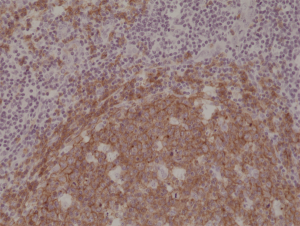anti-CD19 (human) Rabbit Monoclonal (RM332)
| Code | Size | Price |
|---|
| REV-31-1219-00-R100 | 100 ul | £455.00 |
Quantity:
Prices exclude any Taxes / VAT
Overview
Antibody Isotype: Rabbit IgG
Antibody Clonality: Recombinant Antibody
Antibody Clone: RM332
Regulatory Status: RUO
Target Species: Human
Applications:
- Immunohistochemistry (IHC)
- Western Blot (WB)
Shipping:
Blue Ice
Storage:
+4°C
Images
Documents
Further Information
Alternate Names/Synonyms:
B-lymphocyte Antigen CD19; B-lymphocyte Surface Antigen B4;
Concentration:
N/A
EClass:
32160000
Form (Short):
liquid
Formulation:
Liquid. 50% Glycerol/PBS with 1% BSA and 0.09% sodium azide.
Handling Advice:
Avoid freeze/thaw cycles.
Immunogen:
A peptide corresponding to the C-terminus of human CD19.
Long Description:
Recombinant Antibody. This antibody reacts to the cytoplasmic domain of human CD19. Applications: WB, IHC. Source: Rabbit. Liquid. 50% Glycerol/PBS with 1% BSA and 0.09% sodium azide. CD19 is a member of the immunoglobulin superfamily and has two Ig like domains. The CD19 molecule is expressed on 100% of the peripheral B cells as defined by expression of kappa or lambda light chains. CD19 appears to be expressed on myeloid leukemia cells, particularly those of monocytic lineage. The receptor for CD19 is an important functional regulator of normal and malignant B cell proliferation, and is expressed in all B cell precursor leukemias. Lymphocytes proliferate and differentiate in response to various concentrations of different antigens. The ability of the B cell to respond in a specific, yet sensitive manner to the various antigens is achieved with the use of low-affinity antigen receptors. CD19 is a cell surface molecule which assembles with the antigen receptor of B lymphocytes in order to decrease the threshold for antigen receptor-dependent stimulation. Besides being a signal-amplifying coreceptor for the B cell receptor (BCR), CD19 can also signal independently of BCR co-ligation and is a central regulatory component upon which multiple signaling pathways converge. Mutation of the CD19 gene results in hypogammaglobulinemia, whereas CD19 overexpression causes B cell hyperactivity. CD19 is a biomarker for normal and neoplastic B cells, as well as follicular dendritic cells. CD19 is critically involved in establishing intrinsic B cell signaling thresholds through modulating both B cell receptor-dependent and independent signaling.
NCBI, Uniprot Number:
P15391
Package Type:
Vial
Product Description:
CD19 is a member of the immunoglobulin superfamily and has two Ig like domains. The CD19 molecule is expressed on 100% of the peripheral B cells as defined by expression of kappa or lambda light chains. CD19 appears to be expressed on myeloid leukemia cells, particularly those of monocytic lineage. The receptor for CD19 is an important functional regulator of normal and malignant B cell proliferation, and is expressed in all B cell precursor leukemias. Lymphocytes proliferate and differentiate in response to various concentrations of different antigens. The ability of the B cell to respond in a specific, yet sensitive manner to the various antigens is achieved with the use of low-affinity antigen receptors. CD19 is a cell surface molecule which assembles with the antigen receptor of B lymphocytes in order to decrease the threshold for antigen receptor-dependent stimulation. Besides being a signal-amplifying coreceptor for the B cell receptor (BCR), CD19 can also signal independently of BCR co-ligation and is a central regulatory component upon which multiple signaling pathways converge. Mutation of the CD19 gene results in hypogammaglobulinemia, whereas CD19 overexpression causes B cell hyperactivity. CD19 is a biomarker for normal and neoplastic B cells, as well as follicular dendritic cells. CD19 is critically involved in establishing intrinsic B cell signaling thresholds through modulating both B cell receptor-dependent and independent signaling.
Purity:
Protein A purified.
Source / Host:
Rabbit
Specificity:
This antibody reacts to the cytoplasmic domain of human CD19.
Transportation:
Non-hazardous
UNSPSC Category:
Primary Antibodies
UNSPSC Number:
12352203
Use & Stability:
Stable for at least 1 year after receipt when stored at -20°C.



